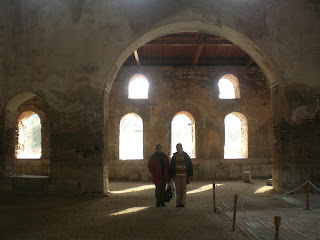
A TRIP TO NICAEA
This weekend we made a trip to Iznik (historical name was Nicaea). It would be pretty nice because our group contains people from different religions and Nicaea is really important place both for muslims and christians but especially for christians.
We recreated a Council of Nicaea but this time the council composed from women. It was nice, informative and a bit comic.
I want to give you some information about real Nicaea council.The First Council of Nicaea is commonly regarded to have been the first Ecumenical Council of the Christian Church. Most significantly, it resulted in the first uniform Christian doctrine, called the Creed of Nicaea. With the creation of the creed, a precedent was established for subsequent general (ecumenical) councils of Bishops (Synods) to create statements of belief and canons of doctrinal orthodoxy— the intent being to define unity of beliefs for the whole of Christendom. The council did not invent the doctrine of the deity of Christ. Instead, the council affirmed and defined what it had found to be the teachings of the Apostles regarding who Christ is; that Christ is the one true God in Deity with the Father.
 Derived from Greek oikoumenikos, "ecumenical" literally means "worldwide" but generally is assumed to be limited to the Roman Empire, as in Augustus' claim to be ruler of the oikoumene/world; the earliest extant uses of the term for a council are Eusebius' Life of Constantine 3.6 around 338 (he convoked an Ecumenical council), Athanasius' Ad Afros Epistola Synodica in 369, and the Letter in 382 to Pope Damasus I and the Latin bishops from the First Council of Constantinople.
Derived from Greek oikoumenikos, "ecumenical" literally means "worldwide" but generally is assumed to be limited to the Roman Empire, as in Augustus' claim to be ruler of the oikoumene/world; the earliest extant uses of the term for a council are Eusebius' Life of Constantine 3.6 around 338 (he convoked an Ecumenical council), Athanasius' Ad Afros Epistola Synodica in 369, and the Letter in 382 to Pope Damasus I and the Latin bishops from the First Council of Constantinople.
Another result of the council was an agreement on when to celebrate the Resurrection, the most important feast of the ecclesiastical calendar. The council decided in favour of celebrating the resurrection on the first Sunday after the first full moon following the verna equinox, independently of the Hebrew Calendar . It authorized the Bishop of Alexandria (presumably using the Alexandrian calendar) to announce annually the exact date to his fellow bishops.
Historically significant as the first effort to attain consensus in the church through an assembly representing all of Christendom the Council was the first occasion for the development of technical Christology. Through it a precedent was set for subsequent general councils to adopt creeds and canons. This council is generally considered the beginning of the period of the First seven Ecumenical Councils in the History of Christianity.

Our group took photos, searched around and connected to each other. We have lerned lats of things from the Tourist Information office.

2 comentarios:
Dear Ayse
Thank you for your article. It´s a nice experience and your historic explanation is perfect.
Could you pick-up some comments or reflections from people who travelled with you? Could be interesting to know their oppinions about sharing experiences with other people from diferent cultures or religions, and you could publish some of them.
Nice photos and interesting story - I LOVE history myself. I would like to know if all of you girls are from Turkey, and how many of you are Christian/muslims. Is it full religious freedom in your country today?
I look forward to visiting Turkey in April, and I'm sure we will learn allot then.
Publicar un comentario